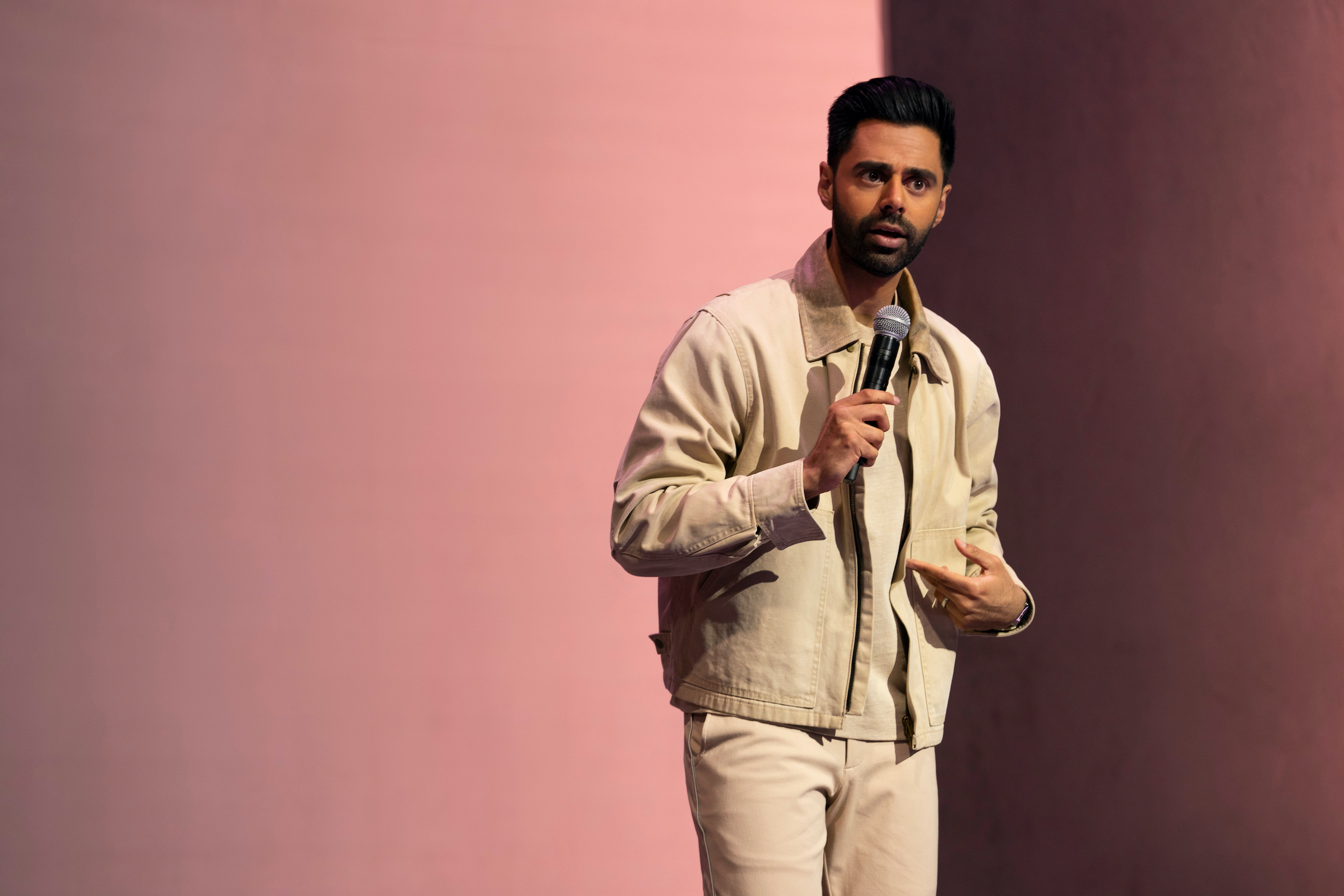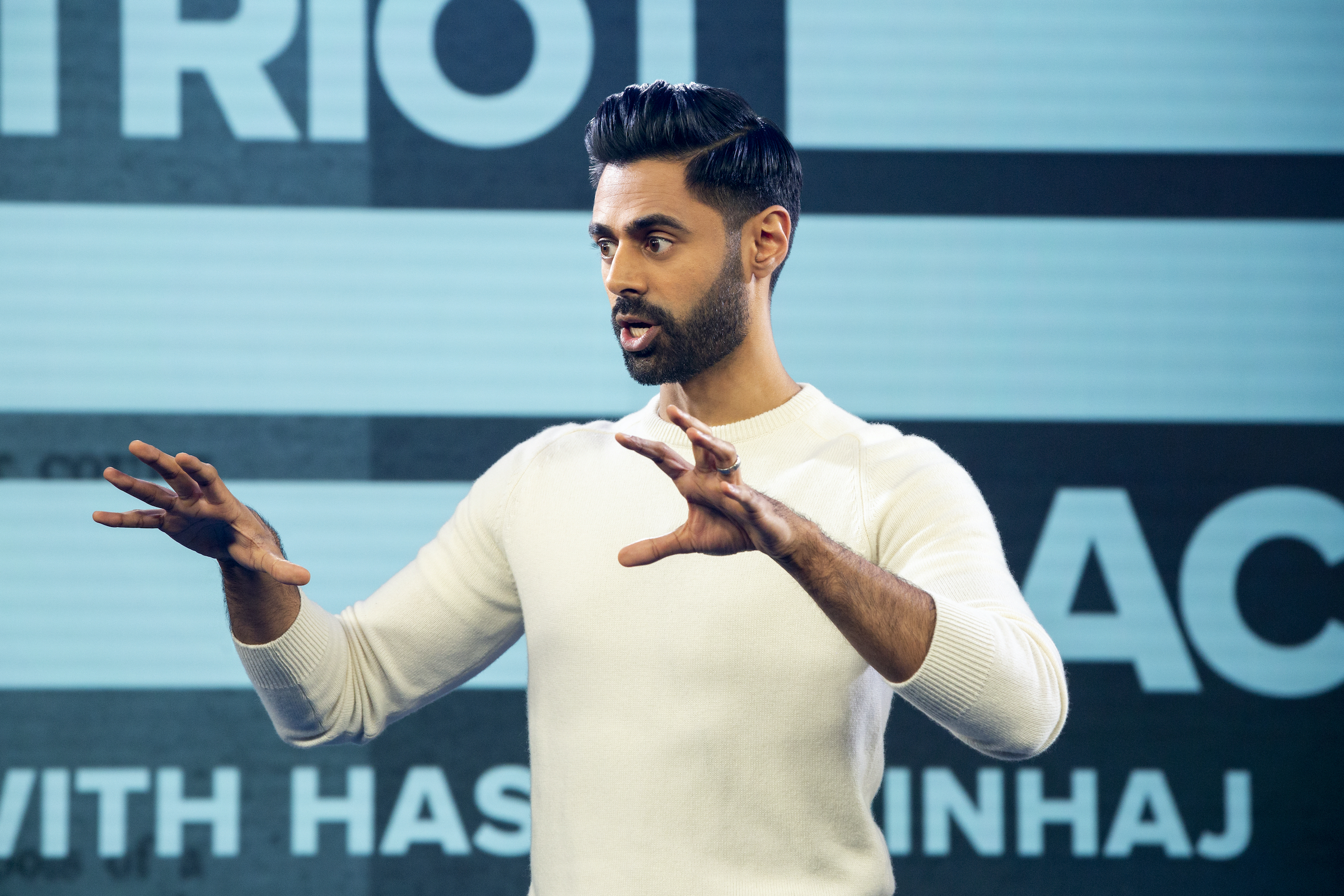
Hasan Minhaj is back on Netflix with The King’s Jester, the comedian’s second special following 2017’s Homecoming King.
In Homecoming King, Minhaj spoke at length about his life as a first generation Muslim Indian American growing up in Davis, Calif.—focusing on his experience as an immigrant, with stories about his parents, hate crimes, racism, prom, and the looming pressure of the phrase “Log kya kahenge?” (What will people think?). The King’s Jester sees the comedian and former host of the Netflix political comedy show Patriot Act with Hasan Minhaj grow into a new phase. After breaking through by centering his material on his cultural background and minority identity, Minhaj now has the space and platform to focus on the full picture of his life in a new set that is intimate, raw, grandiose, and even embarrassing at times.
Minhaj has always known how to tell a story—performing with a certain sleight of hand, building up earnest and vulnerable moments, and breaking them in an instant. Whether he’s considering the hubris of getting consumed by fame or getting deep about fertility problems, Minhaj performs comedy like it’s theater. He pirouettes across the stage, voice breaking when he gets emotional; he flops to the floor to confess things like, “Malala follows me on Instagram, and I don’t follow her back.” After four years of waiting for a child, when his daughter is born and his wife tells him to “promise you will always protect this family,” he replies “Of course. I need you…for material. Stand-up doesn’t write itself.”
Comedy moves beyond cultural commentary
With The King’s Jester, Minhaj has become part of a new generation of comedians of color who have moved beyond focusing only on cultural differences as the driving force behind their jokes, a practice popularized by comedians like Chris Rock, Russell Peters, and Margaret Cho in the 1990s and early-2000s and continued in years since by others, including Lilly Singh, Hari Kondabolu, Romesh Ranganathan, and Nimesh Patel. In his first Netflix special, Asian Comedian Destroys America!, Ronny Chieng focuses on race and identity politics from the perspective of an insider and outsider (Chieng is Malaysian Chinese and has lived in Singapore and Australia). His second special, Speakeasy, adds more detail about his experience growing up in Singapore—but tells us little about himself beyond his relationship with America.
But comedians of color are defining themselves beyond their race or gender. For example, while much of Trevor Noah’s comedy specials have covered similar themes about South Africa, race, politics, and identity, his most recent special Son of Patricia also dives into a discussion of family and the lessons that he’s learned from his mother. Comedians like Aparna Nancherla and Ali Wong have developed their own distinctive styles outside cultural commentary and followed it consistently throughout their careers. Wong has always led with an unapologetic and provocative voice and focus on marriage, motherhood, and monogamy. Rather than going heavy on one-liners, her sets are focused on telling a deeper story through form-driven comedy.
Read More: Comedians’ Obsession With Their Haters Is Ruining Comedy
Like Wong, Minhaj uses his platform to share stories about his life, not just move from laugh to laugh—or make a punchline out of his differences. He adds cultural nuance without feeling the need to qualify it. In Homecoming King, he translated Hindi phrases and offered explanations, like, “Hindus and Muslims are like the Montagues and Capulets of India.” But with Patriot Act, which ran from October 2018 to June 2020, he began shedding the additional context, singing Kuch Kuch Hota Hai and going on a tangent about lotas, and allowing viewers to figure out the references on their own.

How Minhaj got here
Across his projects, Minhaj is always open about his missteps and regrets, from explaining how he did a comedy set after learning that his dad had a heart attack in Homecoming King to talking about how fame put his family in danger in The King’s Jester. The new special allows Minhaj to address how he sees his sense of purpose in the public eye: In The King’s Jester, he explains that he’s built his career to create the sense of justice that he lacked as a Muslim kid growing up in the U.S. He shares a story about Brother Eric, a white man who joined his mosque and turned out to be an undercover FBI informant through the Patriot Act, a law created in response to the 9/11 terror attacks, through which the U.S. government coerced Muslims to falsely confess to terrorism, with victims who were just like Minhaj. “One town next to me, there was a 16-year-old kid, his name was Hamid Hayat. He gave a false confession,” Minhaj says. “This kid served 20 years in prison. He’s my age, he’s 36. I think about Hamid all the time. That’s why, when I finally got my own shot to do my own show on Netflix, I named that sh-t Patriot Act.”
Read More: Everything to Know About the Try Guys Cheating Drama
With his own show, Minhaj had control and aimed his platform toward exposing the wrongdoings of the powerful. In the first episode of Patriot Act, he criticized Saudi Arabian prince Mohammed bin Salman, and made global headlines. Suddenly, he was the #1 trending topic on Twitter (“I become bigger than BTS,” he jokes).
In The King’s Jester, Minhaj, no longer a comedian on the rise, opens up about the toxic sides of fame—and the risks of criticizing public figures. At the height of his notoriety, Minhaj learns that he is on the 2019 TIME100. Speaking at the TIME100 Gala that year, he uses his speech as an opportunity to try to convince Jared Kushner, who is reportedly friends with Mohammad bin Salman, to persuade him to release Saudi activist Loujain al-Hathloul, a 2019 TIME100 honoree who was in prison for advocating for women’s rights.
This incident leads Minhaj to a “power trip” that comes from “trending number one again.” His wife questions whether he actually cares about the cause, or if his activism is all performative. In future episodes of Patriot Act, Minhaj decides to get another dose of “social media meth” by “going after every single dictator in the world.” Like Icarus flying too close to the sun, this fame gets him to a point where he rips open fan mail to find white powder which falls into his daughter’s stroller and makes them rush to the emergency room. His wife tells him “You chose clout over our kids …You get to say whatever you want onstage, and we have to live with the consequences.”
In the special, Minhaj says he considers himself as a jester of powerful figures like Russian president Vladimir Putin and Indian prime minister Narendra Modi because “no matter how much money or power or fame you have, you can’t buy your way out of ridicule.” After establishing himself based on jokes about his immigrant story, Minhaj can now use his platform to talk about broader truths. He tells the audience, “I want to be able to switch between satire and sincerity and trust that you will know the difference.”
More Must-Reads from TIME
- Cybersecurity Experts Are Sounding the Alarm on DOGE
- Meet the 2025 Women of the Year
- The Harsh Truth About Disability Inclusion
- Why Do More Young Adults Have Cancer?
- Colman Domingo Leads With Radical Love
- How to Get Better at Doing Things Alone
- Michelle Zauner Stares Down the Darkness
Contact us at letters@time.com